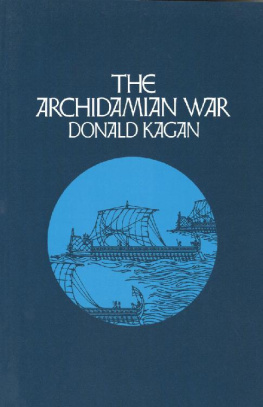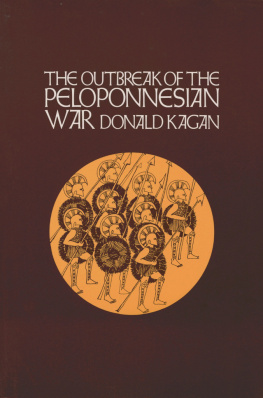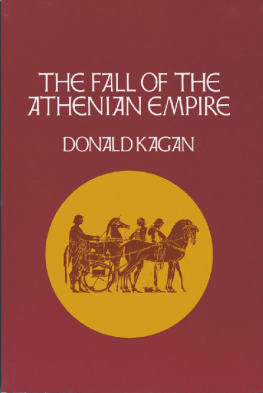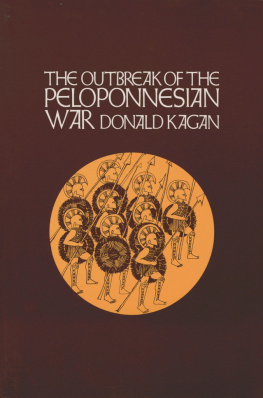Kagan - The Archidamian War
Here you can read online Kagan - The Archidamian War full text of the book (entire story) in english for free. Download pdf and epub, get meaning, cover and reviews about this ebook. year: 2013, publisher: Cornell University Press, genre: History. Description of the work, (preface) as well as reviews are available. Best literature library LitArk.com created for fans of good reading and offers a wide selection of genres:
Romance novel
Science fiction
Adventure
Detective
Science
History
Home and family
Prose
Art
Politics
Computer
Non-fiction
Religion
Business
Children
Humor
Choose a favorite category and find really read worthwhile books. Enjoy immersion in the world of imagination, feel the emotions of the characters or learn something new for yourself, make an fascinating discovery.
The Archidamian War: summary, description and annotation
We offer to read an annotation, description, summary or preface (depends on what the author of the book "The Archidamian War" wrote himself). If you haven't found the necessary information about the book — write in the comments, we will try to find it.
Kagan: author's other books
Who wrote The Archidamian War? Find out the surname, the name of the author of the book and a list of all author's works by series.
The Archidamian War — read online for free the complete book (whole text) full work
Below is the text of the book, divided by pages. System saving the place of the last page read, allows you to conveniently read the book "The Archidamian War" online for free, without having to search again every time where you left off. Put a bookmark, and you can go to the page where you finished reading at any time.
Font size:
Interval:
Bookmark:
The Archidamian War
DONALD KAGAN

Cornell University Press
ITHACA AND LONDON
For Myrna
Preface
This book is a sequel to The Outbreak of the Peloponnesian War and is part of a general history of that war which will require another volume or two to complete. The subject has not been treated on a large scale since the turn of the century; the important scholarship that has intervened and the continued interest in the war amply justify an attempt at a new history.
The present volume deals with the first ten years, the Archidamian War. That struggle, beginning in 431, deserves a volume of its own, for to contemporaries it appeared to be a war complete in itself. Only hindsight and the special perception of Thucydides placed it, together with the diplomatic maneuverings of the Peace of Nicias in 421 and with the events from the resumption of hostility after the Sicilian expedition to the surrender of Athens in 404, as a single war of twenty-seven years and separated it from the war between the Peloponnesians and Athenians of 461445. The Archidamian War, moreover, was the war planned by the Peloponnesian and Athenian strategists, and so the one that tested their skill and prescience. Because the conditions and character of the war could be foreseen, as far as such things are ever predictable, it is possible to make some judgment of the wisdom of each policy and the effectiveness of its execution. The main purpose of this volume, however, is to attempt a general history of the Greek states in their conduct of the war that does justice to military, political, diplomatic, and economic developments and shows how closely they were related.
My views about the use of ancient sources other than Thucydides, the interpretation of the speeches in Thucydides, and the problem of the composition of his history remain those I set forth in the Preface to The Outbreak of the Peloponnesian War. Since these matters remain controversial, I have argued for my opinion at appropriate places in this volume.
I have chosen to organize the book annalistically, as Thucydides organizes his. This method has shortcomings, for which Thucydides has been reproached. It leads to the artificial division of continuing events and prevents their most effective presentation; it may lead to repetition or confusion. I have consciously run these risks in an attempt to avoid the paralyzing force of hindsight, to present the events in the contexts in which they appear to the participants. I hope in that way to emphasize the choices open to them and their lack of any sense of predestination. I hope the gain in immediacy and reality will offset the loss in fluidity and grace.
Most readers will quickly recognize my debt to three great German historians, Georg Busolt, K. J. Beloch, and Eduard Meyer, and of these my debt to the wise, sober, and judicious Busolt is the heaviest. Among the scores of modern historians who have helped to shape my knowledge and understanding of the period, I must single out for special mention A. W. Gomme and the continuators of his splendid commentary on Thucydides, A. Andrewes and K. J. Dover; also Russell Meiggs and David Lewis, whose fine edition of the Greek inscriptions has done so much for historians, and B. D. Meritt, H. T. Wade-Gery, and M. F. McGregor, whose publication of The Athenian Tribute Lists initiated an era in the study of Greek history.
I am grateful to B. M. W. Knox and to Ronald P. Legon for reading the manuscript and for their encouragement. Thanks are due also to the two anonymous publishers readers, who made many valuable suggestions and helped to eliminate a number of errors. I also want to thank Janalyn Gibb for typing the manuscript and John Hale for helping to prepare the maps. Finally, I wish to express my thanks to the National Endowment for the Humanities and to Yale University for providing me with time to complete this volume.
D ONALD K AGAN
New Haven, Connecticut
Contents
Maps
Abbreviations and Short Titles
| A Class | Acta Classica |
| AFD | B. D. Meritt, Athenian Financial Documents |
| AJA | American Journal of Archaeology |
| AJP | American Journal of Philology |
| ASI | E. Badian, ed., Ancient Society and Institutions |
| ATL | B. D. Meritt, H. T. Wade-Gery, and F. M. McGregor, The Athetiian Tribute Lists |
| BCH | Bulletin de correspondance helletiique |
| BSA | Proceedings of the British School at Athens |
| Beloch, Bevlkerung | K. J. Beloch, Die Bevlkerung der griechischrmischen Welt |
| Beloch, GG | K. J. Beloch, Griechische Geschichte, 2d ed. |
| Bengtson, GG | H. Bengston, Griechische Geschichte, 2d ed. |
| Bengtson, Staatsvertrge | H. Bengtson, Die Staatsvertrge der griechischrmischen Welt von bis 338 v. Chr. |
| Busolt, GG | G. Busolt, Griechische Geschichte |
| CAH | Cambridge Ancient History |
| CIA | Corpus Inscriptionum Atticarum |
| CP | Classical Philology |
| CQ | Classical Quarterly |
| CR | Classical Review |
| Delbrck, Strategie | H. Delbrck, Die Strategic des Perikles |
| Duncker, GdA | M. Duncker, Geschichte des Altertums |
| FGrH | F. Jacoby, Die Fragmente der griechischen Historiker |
| GHI | R. Meiggs and D. Lewis, A Selection of Greek Historical Inscriptions |
| GRBS | Greek, Roman, and Byzantine Studies |
| Gomme, HCT | A. W. Gomme, A Historical Commentary on Thucydides |
| Grote | George Grote, A History of Greece |
| HSCP | Harvard Studies in Classical Philology |
| Henderson, Great War | B. W. Henderson, The Great War between Athens and Sparta |
| Hignett, HAC | C. Hignett, A History of the Athenian Constitution |
| IG | Inscriptiones Graecae |
| JHS | Journal of Hellenic Studies |
| Kagan, Outbreak | D. Kagan, The Outbreak of the Peloponnesian War |
| Meyer, Forsch. | E. Meyer, Forschungen zur alten Geschichte, II |
| Meyer, GdA | E. Meyer, Geschichte des Altertums |
| PA | Prosopographia Attica |
| PACA | Proceedings of the African Classical Association |
| PW | Pauly-Wissowa and others, Realenzy klopdie der klassischen Altertumswissenschaft |
| REG | Revue des tudes grecques |
| TAPA | Transactions of the American Philological Association |
| Sealey, Essays | R. Sealey, Essays in Greek History |
| Westlake, Essays | H. D. Westlake, Essays on Greek Historians and Greek History |
1. Plans and Resources
In the spring of 431 a band of more than three hundred Thebans, under cover of darkness, launched a surprise attack on the neighboring city of Plataea. Because Thebes was an ally of Sparta and the Plataeans were allied to Athens, this action was an open breach of the Thirty Years Peace of 445. So began the great Peloponnesian War, which lasted, with several interruptions, for twenty-seven years. Since ancient times the first ten years of the great war, concluded by the Peace of Nicias in 421, have been regarded as a unit and called, after the name of the Spartan king who led its early campaigns, the Archidamian War.
Examination of the Archidamian War as a unit apart from the events that followed is useful and revealing. Although many surprises took place in the decade of its course, the war was fought essentially within the framework established by those who embarked on it. Departures from the original strategies were necessary, but none compared with the great changes that followed the Peace of Nicias. The sending of an Athenian army into the heart of the Peloponnese in 418, the invasion of Sicily, the shift of the center of warfare from the mainland to the Aegean and the Hellespont, all were unforeseen by the men who began the war. They could not have anticipated what happened after 421, when conditions and personnel presented a completely new situation. Although most of the events of the Archidamian War itself do not in retrospect seem entirely surprising, it is interesting for us to ask how well the several states and their leaders anticipated the course of action. How promising were the strategies followed by each side? Did the Athenians and Spartans estimation of the situation in 431 justify their decisions to run the risks of war?
Next pageFont size:
Interval:
Bookmark:
Similar books «The Archidamian War»
Look at similar books to The Archidamian War. We have selected literature similar in name and meaning in the hope of providing readers with more options to find new, interesting, not yet read works.
Discussion, reviews of the book The Archidamian War and just readers' own opinions. Leave your comments, write what you think about the work, its meaning or the main characters. Specify what exactly you liked and what you didn't like, and why you think so.














